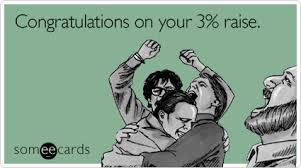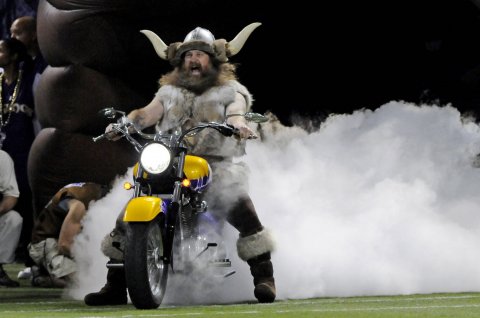More on the performance curve
About a year ago I published a piece called 'The Performance Curve', a quick look at how in professional baseball decades of analysis of player performance reveal a very typical average performance curve. Player performance, (hits, home runs, wins for a pitcher, etc.), almost universally 'peaks' at about age 29 or 30, and almost always begins to decline, sometimes steeply, at about age 31. The chart I used in that post is below:
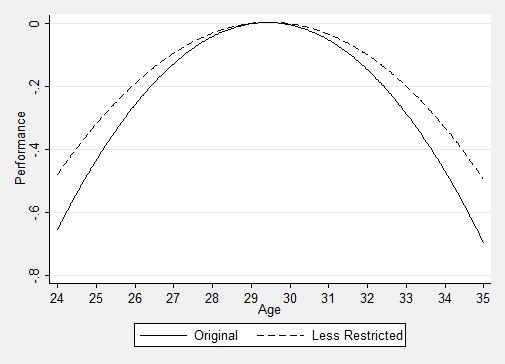
The specifics of the Y-axis values don't really matter for the point I am after, (they represent standard deviations from 'peak' performance', but simply looking at the data we see for both the original study sample (veteran players with 10+ years of data), and 'less restricted' players, (more or less everyone else), that performance peaks in the late 20s and declines, predictably, from there. Keep this data in mind the next time your favorite team drops a 7-year, $125M contract on your best 31 year old slugger.
Last year my point in running the post was that these kinds of performance curves likely exist, and are becoming more discoverable, in all kinds of jobs due to the increase and improved capability of tools and technologies to better manage, track, and analyze performance. I still think those conclusions to be true a year later.
But what got me thinking about that post from last year was yet another chart I saw this week, this one excerpted from the bank HSBC on the macro-impact of changing demographics, particularly in the workforce of industrialized countries. Take a look at the chart below, on the generalized productivity (as defined by output), across the typical worker's life-cycle:
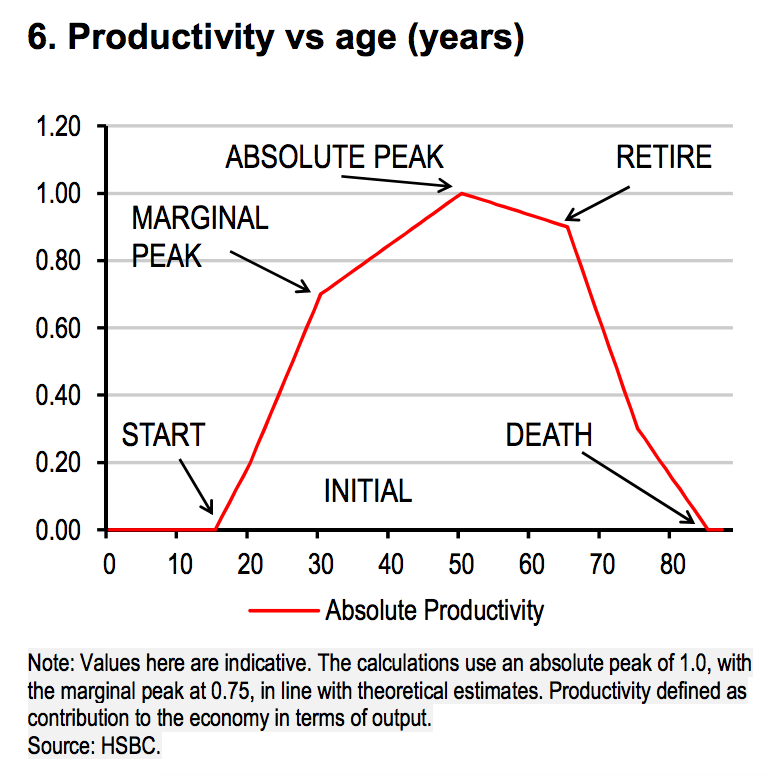
According to HSBC, and unlike the data we see with baseball players, 'performance', (again, in this case limited to a measurement of productivity), continues to climb during a worker's life, peaking at around age 50 or so. And worth noting, even though the productivity peak hits at about 50 and this average worker still has about 15-18 more years of work ahead, that the relative productivity in that last decade+ is still relatively high.
Said a little differently, HSBC is saying that a workforce made up of 50 - 65 year-olds would be, on aggregate, more productive than one made up of 30 - 45 year-olds, all other things being equal. Obviously, this is data that should be taken in a very general sense, as we have seen from the baseball example, there are many roles whose physical requirements negate the increased productivity effects of age/experience have on other roles. So while a 55 year-old first baseman will never be able to compete physically with a 28 year-old one, change the role from 'first baseman' to 'accounting manager' and we may have a very, very different outcome.
Last thing I want to leave you with on this, and the thing to take away and really think about is what is happening, (again, in a general way), in labor forces across the industrialized world, and what will continue into the next 10 years or so. Here is another chart that shows how the workplace and workers are skewing older, courtesy of Jed Kolko:
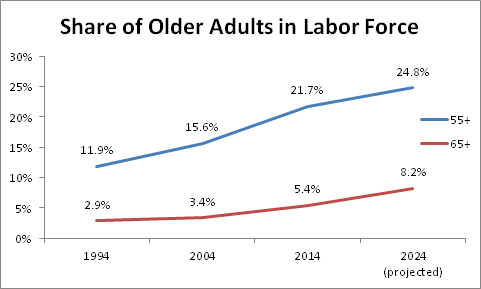
The combination of more rapid population growth and increasing labor force participation among older workers are expected to result in about one-quarter of the workforce by 2024 being aged 55+. That is a huge increase from only 20 years prior, (1994), when the percentage of workers aged 55+ was only about 12%. And workers 65+ are expected to make up almost 10% of the workforce by 2024, up from less than 3% just 20 years prior.
There is plenty to think about here for sure, and as usual, no simple answers. The workforce is certainly skewing older, that seems to be indisputable. But what that means to organizational performance is not as clear, unless you are managing baseball players. For the rest of us, thinking about how these changes will or at least should impact how we hire, develop, coach, train, and mentor employees in the next 10 -15 years is probably one of the most important human capital challenges we will face. Think about it.
Ok, that's it - I'm out. I need to get back to being super-productive (judging on where I sit on the curve).
 Career,
Career,  workforce tagged
workforce tagged  HR,
HR,  career,
career,  demographics,
demographics,  performance,
performance,  workforce
workforce  Email Article
Email Article 
 Print Article
Print Article 

